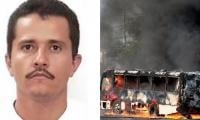Pakistan proposes four peace initiatives to India
PM addresses UN General Assembly; proposes ceasefire on LoC, no threat to use force, demilitarisation of Kashmir and Siachen; says our people need to prosper; UN Security Council of the powerful, privileged not acceptable; Operation Zarb-e-Azb largest anti-terrorism campaign; tensions between Afghanistan, Pakistan in neither country’s interest;
By our correspondents
October 01, 2015
UNITED NATIONS: Prime Minister Nawaz Sharif has proposed four peace initiatives to India, including demilitarisation of Kashmir for restoration of ties between the two countries.
Addressing the 70th Summit of the United Nations General Assembly (UNGA) here on Wednesday, the prime minister termed his proposals simplest to implement and described the points as: That Pakistan and India formalise and respect the 2003 understanding for a complete ceasefire on the Line of Control (LoC) in Kashmir and for this purpose, we call for UNMOGIP’s expansion to monitor the observance of the ceasefire. Two: Pakistan and India reaffirm that they will not resort to the use or threat of use of force under any circumstances. This is a central element of the UN Charter. Three: Steps are taken to demilitarise Kashmir. Four: Agree to an unconditional mutual withdrawal from the Siachen Glacier, the world’s highest battleground.
Referring to his policy for building a peaceful neighbourhood, Prime Minister Nawaz Sharif said that our peoples need peace to prosper. Peace can be achieved through dialogue, not disengagement. He emphasised the need for consultations with Kashmiris, who are an integral part of the dispute and are essential to evolving a peaceful solution.
The prime minister refrained from following harsh diplomatic jargons and chose soft words to establish Pakistan’s case before the UNGA. He reminded that the despite the constraints of the Cold War, the United Nations served the international community as the beacon of hope, the repository of freedom, an advocate of the oppressed, a vehicle for development and progress. “But, we – the peoples of the United Nations – have not succeeded in beating our arms into ploughshares or promoting universal prosperity and larger freedoms,” he added.
He pointed out that confrontation among major powers had returned at a time when many parts of the world are in turmoil. Terrorism is spreading. Poverty and deprivation are yet to be overcome. Gross violations of human rights are rampant. “We are witnessing human dislocation – refugees and forced migrants – on a scale not witnessed for over half a century. Our very existence is threatened by the wanton damage done to our planet’s life sustaining systems,” he said.
Dilating upon the UN reforms, Nawaz Sharif said that Pakistan supports a comprehensive reform of the United Nations, including that of the Security Council. “We need a Security Council that is more democratic, representative, accountable and transparent. A Council that reflects the interests of all member states, in accordance with the principle of sovereign equality. Not a Council, which is an expanded club of the powerful and privileged,” he said.
Discussing terrorism, the prime minister said that Pakistan is the primary victim of terrorism. “We have lost thousands of lives, including civilians and soldiers, to terrorist violence. The blood that has been shed – including that of our innocent children – has reinforced our resolve to eliminate this scourge from our society. We will fight terrorism in all its forms and manifestations, irrespective of who their sponsors are.”
Talking about the operation against terrorism, he recalled that the Operation Zarb-e-Azb was the largest anti-terrorism campaign against terrorists anywhere, involving over 180,000 personnel of our security forces. It has made substantial progress in cleansing our country of all terrorists and will conclude only when our objective has been accomplished. This operation is complemented by an all-inclusive National Action Plan. It encompasses police and security actions, political and legal measures and social and economic policy packages, aimed at countering violent extremism. The global threat of terrorism cannot be defeated unless we address its underlying causes. Poverty and ignorance are part of the problem. Extremist ideologies must be opposed, he said.
“But the narrative of the terrorists also has to be countered through the just resolution of the several instances of oppression and injustice against Muslims in various parts of the world. Unfortunately, some seek to use the global campaign against terrorism to suppress the legitimate right of occupied peoples to self-determination,” the prime minister said. He said that the rise and spread of terrorism across the Middle East today poses unprecedented security challenges. Wracked by violence, ethnic and sectarian conflicts, and the rise of Daish, several countries of the region are today the vortex of conflict and instability. Others are being sucked into this quagmire, he added.
The prime minister reminded that today, our interdependent world possesses the financial, scientific and organisational capabilities to address these diverse and interrelated challenges that pose a common threat to all member states. “At the historic Summit over the weekend, we have collectively committed ourselves to achieve 17 Sustainable Development Goals, to promote equitable and inclusive development for all our peoples. The real challenge remains – to mobilise the collective political will and resources to ensure the comprehensive implementation of the agenda we have solemnly endorsed,” Nawaz said.
He said that Pakistan has already initiated action on national goals to promote the Post-2015 Development Agenda. “We are also creating a robust mechanism for the monitoring and implementation of these goals and targets. Later this year in Paris, we will need to respond with common but differentiated responsibility to the threat posed by climate change. Partisan interests must not stand in the way of an ambitious and collective commitment to halt and reverse the damage done to our planet,” he said.
The prime minister, who co-hosted the summit on UN peacekeeping, said that peacekeeping has been one of the key responsibilities of the United Nations. “Pakistan is proud of its historic and current role as a major troop contributor. We regard it as our obligation to uphold international peace and security,” he said.
Premier Nawaz also raised the issue of Palestine and said that the tragedy of Palestine had intensified. The accepted avenue for peace between Palestine and Israel – a two state solution – appears further away today than ever before, due to the intransigent stance of the occupying power.
“Yet as I speak, the proud Palestinian flag is being raised just outside this hall. We hope this is just the first step. We look forward to welcoming Palestine as a full member of the United Nations.”
He said that Muslims are suffering across the world: Palestinians and Kashmiris oppressed by foreign occupation; persecuted minorities; and the discrimination against Muslim refugees fleeing persecution or war. The international community must redress these injustices against the Muslim people.
Welcoming the Iran-US nuclear deal, Prime Minister Nawaz said that this shows what diplomatic engagement and multilateralism can achieve. It augurs well for the peace and security of our region and beyond.
While giving his mind on the situation in Afghanistan, the premier said that Pak-Afghan relations underwent a positive transformation after the advent of the National Unity government in Kabul. In response to the request from the Afghan government and with the support of the international community, Pakistan made strenuous efforts to facilitate the process of Afghan reconciliation. Dialogue did open between the Afghan government and the Taliban, which was an unprecedented first.
But it was unfortunate that certain developments stalled the process. Thereafter, militant attacks intensified, which we unequivocally condemn. “Pakistan will persist in the endeavour to help resume the dialogue process and promote peace and stability in Afghanistan. We can, however, do so only if we receive the required cooperation from the Afghan government. Tensions between Afghanistan and Pakistan are in neither country’s interests,” he added. “We are encouraged that the international community, including the major powers, desire continuation of the peace process in Afghanistan. Pakistan greatly appreciates China’s proactive role in promoting peace and prosperity in Afghanistan and our region. We welcome China’s vision of One Belt, One Road, he said.
Nawaz Sharif said that the China-Pakistan Economic Corridor, (CPEC), announced during President Xi Jinping’s visit to Pakistan earlier this year, will spur regional economic integration and bring prosperity to the entire region and beyond. “This is an inspiring model of South-South cooperation that should be emulated.”
He said “we also welcome Russia’s greater focus on Asian cooperation.” The Shanghai Cooperation Organisation, which Pakistan will be joining this year as a full member, holds great promise for promoting regional connectivity.
The prime minister said that the history of South Asia is one of missed opportunities. Among its dire consequences is the persistence of poverty and deprivation in our region. “Development is my government’s first priority and has underpinned my policy to build a peaceful neighbourhood. In 1997, when the Composite Dialogue was launched with India, our two countries agreed that this would encompass two principal items: Kashmir and Peace and Security, along with six other issues, including terrorism. The primacy and urgency of addressing these two issues is even more compelling today,” Nawaz said. He reminded the world that since 1947, the Kashmir dispute has remained unresolved. The UN Security Council resolutions have remained unimplemented. “Three generations of Kashmiris have only seen broken promises and brutal oppression. Over 100,000 have died in their struggle for self-determination. This is the most persistent failure of the United Nations,” he said.
Nawaz Sharif said: “When I assumed office of the Prime Minister of Pakistan in June 2013, for the third time, one of my first priorities was to normalise relations with India. I reached out to the Indian leadership to emphasise that our common enemy was poverty and underdevelopment. Cooperation, not confrontation, should define our relationship. Yet today ceasefire violations along the Line of Control and the Working Boundary are intensifying, causing civilian deaths, including women and children. Wisdom dictates that our immediate neighbour refrains from fomenting instability in Pakistan. The two countries should address and resolve the causes of tension and take all possible measures to avert further escalation.”
Referring to his initiative towards India, he said that an easing of threat perceptions through such peace efforts will make it possible for Pakistan and India to agree on a broad range of measures to address the peril posed by offensive and advanced weapons systems. Pakistan neither wants to, nor is it engaged in, an arms race in South Asia. We cannot, however, remain oblivious to the evolving security dynamics and arms build-up in our region, which obliges us to take essential steps to maintain our security. He said that as a responsible nuclear weapon state, Pakistan will continue to support the objectives of nuclear disarmament and non-proliferation. We have maintained the highest standards of nuclear security and have established an effective regime to ensure the safety and security of our nuclear facilities and stocks.
“South Asia needs strategic stability and this requires serious dialogue to achieve nuclear restraint, conventional balance and conflict resolution,” he said. He concluded by saying that we look forward to playing our part to build a brighter era of peace and prosperity in South Asia. We owe it to our people and to succeeding generations.”
Addressing the 70th Summit of the United Nations General Assembly (UNGA) here on Wednesday, the prime minister termed his proposals simplest to implement and described the points as: That Pakistan and India formalise and respect the 2003 understanding for a complete ceasefire on the Line of Control (LoC) in Kashmir and for this purpose, we call for UNMOGIP’s expansion to monitor the observance of the ceasefire. Two: Pakistan and India reaffirm that they will not resort to the use or threat of use of force under any circumstances. This is a central element of the UN Charter. Three: Steps are taken to demilitarise Kashmir. Four: Agree to an unconditional mutual withdrawal from the Siachen Glacier, the world’s highest battleground.
Referring to his policy for building a peaceful neighbourhood, Prime Minister Nawaz Sharif said that our peoples need peace to prosper. Peace can be achieved through dialogue, not disengagement. He emphasised the need for consultations with Kashmiris, who are an integral part of the dispute and are essential to evolving a peaceful solution.
The prime minister refrained from following harsh diplomatic jargons and chose soft words to establish Pakistan’s case before the UNGA. He reminded that the despite the constraints of the Cold War, the United Nations served the international community as the beacon of hope, the repository of freedom, an advocate of the oppressed, a vehicle for development and progress. “But, we – the peoples of the United Nations – have not succeeded in beating our arms into ploughshares or promoting universal prosperity and larger freedoms,” he added.
He pointed out that confrontation among major powers had returned at a time when many parts of the world are in turmoil. Terrorism is spreading. Poverty and deprivation are yet to be overcome. Gross violations of human rights are rampant. “We are witnessing human dislocation – refugees and forced migrants – on a scale not witnessed for over half a century. Our very existence is threatened by the wanton damage done to our planet’s life sustaining systems,” he said.
Dilating upon the UN reforms, Nawaz Sharif said that Pakistan supports a comprehensive reform of the United Nations, including that of the Security Council. “We need a Security Council that is more democratic, representative, accountable and transparent. A Council that reflects the interests of all member states, in accordance with the principle of sovereign equality. Not a Council, which is an expanded club of the powerful and privileged,” he said.
Discussing terrorism, the prime minister said that Pakistan is the primary victim of terrorism. “We have lost thousands of lives, including civilians and soldiers, to terrorist violence. The blood that has been shed – including that of our innocent children – has reinforced our resolve to eliminate this scourge from our society. We will fight terrorism in all its forms and manifestations, irrespective of who their sponsors are.”
Talking about the operation against terrorism, he recalled that the Operation Zarb-e-Azb was the largest anti-terrorism campaign against terrorists anywhere, involving over 180,000 personnel of our security forces. It has made substantial progress in cleansing our country of all terrorists and will conclude only when our objective has been accomplished. This operation is complemented by an all-inclusive National Action Plan. It encompasses police and security actions, political and legal measures and social and economic policy packages, aimed at countering violent extremism. The global threat of terrorism cannot be defeated unless we address its underlying causes. Poverty and ignorance are part of the problem. Extremist ideologies must be opposed, he said.
“But the narrative of the terrorists also has to be countered through the just resolution of the several instances of oppression and injustice against Muslims in various parts of the world. Unfortunately, some seek to use the global campaign against terrorism to suppress the legitimate right of occupied peoples to self-determination,” the prime minister said. He said that the rise and spread of terrorism across the Middle East today poses unprecedented security challenges. Wracked by violence, ethnic and sectarian conflicts, and the rise of Daish, several countries of the region are today the vortex of conflict and instability. Others are being sucked into this quagmire, he added.
The prime minister reminded that today, our interdependent world possesses the financial, scientific and organisational capabilities to address these diverse and interrelated challenges that pose a common threat to all member states. “At the historic Summit over the weekend, we have collectively committed ourselves to achieve 17 Sustainable Development Goals, to promote equitable and inclusive development for all our peoples. The real challenge remains – to mobilise the collective political will and resources to ensure the comprehensive implementation of the agenda we have solemnly endorsed,” Nawaz said.
He said that Pakistan has already initiated action on national goals to promote the Post-2015 Development Agenda. “We are also creating a robust mechanism for the monitoring and implementation of these goals and targets. Later this year in Paris, we will need to respond with common but differentiated responsibility to the threat posed by climate change. Partisan interests must not stand in the way of an ambitious and collective commitment to halt and reverse the damage done to our planet,” he said.
The prime minister, who co-hosted the summit on UN peacekeeping, said that peacekeeping has been one of the key responsibilities of the United Nations. “Pakistan is proud of its historic and current role as a major troop contributor. We regard it as our obligation to uphold international peace and security,” he said.
Premier Nawaz also raised the issue of Palestine and said that the tragedy of Palestine had intensified. The accepted avenue for peace between Palestine and Israel – a two state solution – appears further away today than ever before, due to the intransigent stance of the occupying power.
“Yet as I speak, the proud Palestinian flag is being raised just outside this hall. We hope this is just the first step. We look forward to welcoming Palestine as a full member of the United Nations.”
He said that Muslims are suffering across the world: Palestinians and Kashmiris oppressed by foreign occupation; persecuted minorities; and the discrimination against Muslim refugees fleeing persecution or war. The international community must redress these injustices against the Muslim people.
Welcoming the Iran-US nuclear deal, Prime Minister Nawaz said that this shows what diplomatic engagement and multilateralism can achieve. It augurs well for the peace and security of our region and beyond.
While giving his mind on the situation in Afghanistan, the premier said that Pak-Afghan relations underwent a positive transformation after the advent of the National Unity government in Kabul. In response to the request from the Afghan government and with the support of the international community, Pakistan made strenuous efforts to facilitate the process of Afghan reconciliation. Dialogue did open between the Afghan government and the Taliban, which was an unprecedented first.
But it was unfortunate that certain developments stalled the process. Thereafter, militant attacks intensified, which we unequivocally condemn. “Pakistan will persist in the endeavour to help resume the dialogue process and promote peace and stability in Afghanistan. We can, however, do so only if we receive the required cooperation from the Afghan government. Tensions between Afghanistan and Pakistan are in neither country’s interests,” he added. “We are encouraged that the international community, including the major powers, desire continuation of the peace process in Afghanistan. Pakistan greatly appreciates China’s proactive role in promoting peace and prosperity in Afghanistan and our region. We welcome China’s vision of One Belt, One Road, he said.
Nawaz Sharif said that the China-Pakistan Economic Corridor, (CPEC), announced during President Xi Jinping’s visit to Pakistan earlier this year, will spur regional economic integration and bring prosperity to the entire region and beyond. “This is an inspiring model of South-South cooperation that should be emulated.”
He said “we also welcome Russia’s greater focus on Asian cooperation.” The Shanghai Cooperation Organisation, which Pakistan will be joining this year as a full member, holds great promise for promoting regional connectivity.
The prime minister said that the history of South Asia is one of missed opportunities. Among its dire consequences is the persistence of poverty and deprivation in our region. “Development is my government’s first priority and has underpinned my policy to build a peaceful neighbourhood. In 1997, when the Composite Dialogue was launched with India, our two countries agreed that this would encompass two principal items: Kashmir and Peace and Security, along with six other issues, including terrorism. The primacy and urgency of addressing these two issues is even more compelling today,” Nawaz said. He reminded the world that since 1947, the Kashmir dispute has remained unresolved. The UN Security Council resolutions have remained unimplemented. “Three generations of Kashmiris have only seen broken promises and brutal oppression. Over 100,000 have died in their struggle for self-determination. This is the most persistent failure of the United Nations,” he said.
Nawaz Sharif said: “When I assumed office of the Prime Minister of Pakistan in June 2013, for the third time, one of my first priorities was to normalise relations with India. I reached out to the Indian leadership to emphasise that our common enemy was poverty and underdevelopment. Cooperation, not confrontation, should define our relationship. Yet today ceasefire violations along the Line of Control and the Working Boundary are intensifying, causing civilian deaths, including women and children. Wisdom dictates that our immediate neighbour refrains from fomenting instability in Pakistan. The two countries should address and resolve the causes of tension and take all possible measures to avert further escalation.”
Referring to his initiative towards India, he said that an easing of threat perceptions through such peace efforts will make it possible for Pakistan and India to agree on a broad range of measures to address the peril posed by offensive and advanced weapons systems. Pakistan neither wants to, nor is it engaged in, an arms race in South Asia. We cannot, however, remain oblivious to the evolving security dynamics and arms build-up in our region, which obliges us to take essential steps to maintain our security. He said that as a responsible nuclear weapon state, Pakistan will continue to support the objectives of nuclear disarmament and non-proliferation. We have maintained the highest standards of nuclear security and have established an effective regime to ensure the safety and security of our nuclear facilities and stocks.
“South Asia needs strategic stability and this requires serious dialogue to achieve nuclear restraint, conventional balance and conflict resolution,” he said. He concluded by saying that we look forward to playing our part to build a brighter era of peace and prosperity in South Asia. We owe it to our people and to succeeding generations.”
-
 Can App Stores Really Keep Kids Off Social Media? Here’s What Experts Says
Can App Stores Really Keep Kids Off Social Media? Here’s What Experts Says -
 Margot Robbie Fears Being Dubbed A 'dumb Blonde' Due To Major Reasons: 'Hates The Idea'
Margot Robbie Fears Being Dubbed A 'dumb Blonde' Due To Major Reasons: 'Hates The Idea' -
 How Kate Middleton's Hyperemesis Gravidarum Left Her 'not The Happiest'
How Kate Middleton's Hyperemesis Gravidarum Left Her 'not The Happiest' -
 USA Beats Canada For First Olympic Hockey Gold In 46 Years; Donald Trump, Barack Obama & Others Hail Historic Victory
USA Beats Canada For First Olympic Hockey Gold In 46 Years; Donald Trump, Barack Obama & Others Hail Historic Victory -
 Claressa Shields Defeats Franchon Crews-Dezurn In Heavyweight Title Rematch
Claressa Shields Defeats Franchon Crews-Dezurn In Heavyweight Title Rematch -
 Sam Altman Calls Elon Musk’s Space Data Center Plan ‘ridiculous’
Sam Altman Calls Elon Musk’s Space Data Center Plan ‘ridiculous’ -
 Kara Braxton, WNBA All-Star And Champion, Dies At 43
Kara Braxton, WNBA All-Star And Champion, Dies At 43 -
 Anthropic Lead Engineer Predicts ‘software Engineer’ Role Can Disappear By 2026
Anthropic Lead Engineer Predicts ‘software Engineer’ Role Can Disappear By 2026 -
 Sharon Details Late Husband Ozzy's Final Days During His Sickness
Sharon Details Late Husband Ozzy's Final Days During His Sickness -
 Magic Vs Clippers: Clippers Announce Kawhi Leonard Status After Exit
Magic Vs Clippers: Clippers Announce Kawhi Leonard Status After Exit -
 BTC Price Today: Bitcoin Sinks Below $65K On Trade Uncertainty
BTC Price Today: Bitcoin Sinks Below $65K On Trade Uncertainty -
 'A Knight Of The Seven Kingdoms': All You Need To Know About The Finale
'A Knight Of The Seven Kingdoms': All You Need To Know About The Finale -
 NYC Travel Ban: Mamdani Shuts Down Roads Amid Blizzard Conditions
NYC Travel Ban: Mamdani Shuts Down Roads Amid Blizzard Conditions -
 Alicia Keys Celebrates 25 Years Of Breakout Single ‘Fallin’’
Alicia Keys Celebrates 25 Years Of Breakout Single ‘Fallin’’ -
 Akinola Davies Jr. Gives His Immigrant Parents A Shoutout In 2026 BAFTAs Acceptance Speech
Akinola Davies Jr. Gives His Immigrant Parents A Shoutout In 2026 BAFTAs Acceptance Speech -
 Princess Beatrice, Eugenie Told 'first Thing They Should Do' After Andrew Arrest
Princess Beatrice, Eugenie Told 'first Thing They Should Do' After Andrew Arrest



